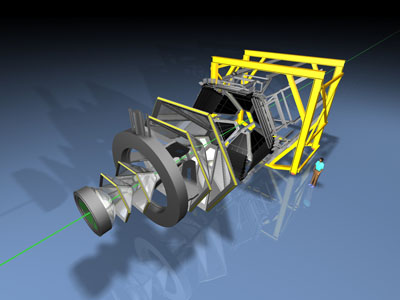
High Acceptance DiElectron Spectrometer :
experiment summary
HADES is a versatile detector for a precise spectroscopy of e+e- pairs (dielectrons) and charged hadrons produced in proton, pion and heavy ion induced reactions in a 1-3.5 GeV kinetic beam energy region. The detector has been set-up at GSI by an international collaboration of 17 institutions from 9 European countries. The main experimental goal is to investigate properties of dense nuclear matter created in the course of heavy ion collisions and ultimately learn about in-medium hadron properties (like masses, decay widths). The matter created in such collisions differs from the one studied at SPS, RHIC or LHC because it consists mainly of baryons (nucleons and its excited states- baryon resonances) and little mesons and can be compressed up to 3 times nuclear matter density for about 10-12 fm/c. Dielectron pairs originating from in-medium hadron decays and rare strange hadrons (kaons, hyperons) are the main probes measured in the experiment. Since conclusions on in-medium effects rely strongly on the understanding of hadron properties in vacuum and their production mechanism in nucleon-nucleon collisions a complementary program focusing on e+e-, kaon and hyperon (Σ, Λ) production in elementary collisions is also in progress. HADES also takes part in the Compressed Baryonic Matter program of FAIR.
